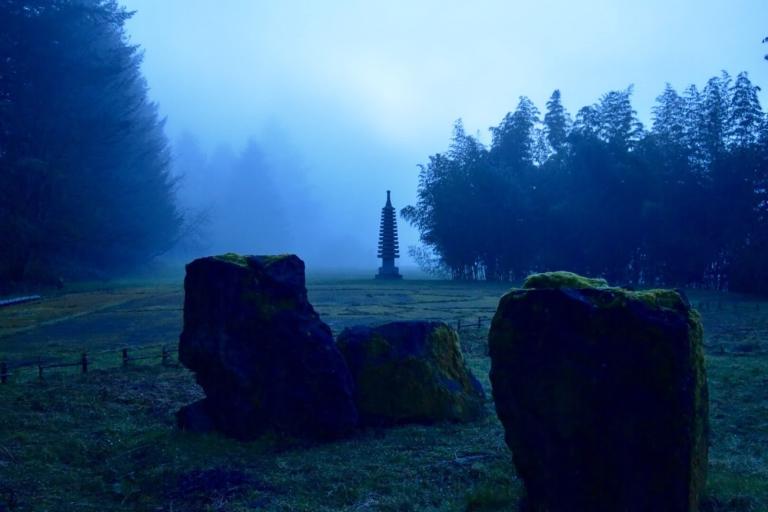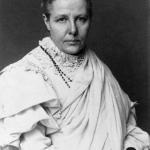On Wednesday morning, the 27th of September, Jan drove me to the Burbank airport where I flew north to San Jose, changed planes, then continued on to Portland. There I was picked up by my friend, colleague in UU world, and in the Zen universe my senior student and an apprentice teacher, Janine Larsen. We paused for lunch in Portland, and then she took me the sixty seven or so miles to Great Vow Zen monastery in Clatskanie, about half way to the coast.
I was on my way there for the first in person gathering of the American Zen Teachers association since the Covid pandemic.
It’s been a good decade since I’ve been to the monastery. Although, I’ve visited a number of times over the many years and feel a particular closeness to them.
Once there I checked in and joined with the about thirty-five Zen teaching colleagues, most of whom had already arrived. We had dinner. The monastery pays attention to food. Vegetarian, not super fancy, but always as tasty as nourishing, and almost always featuring something from their gardens or orchard.
The AZTA, the American Zen Teachers Association, is one of the two long lasting gatherings of Zen teachers in North America. This one’s distinction is that it is a very, very loose organization and open beyond sectarian identity within the Zen family. It is meant to be a support group. And it is not a legal entity with bylaws and a board. For years I thought it should be more. But then when someone was seriously disruptive a few years back, I was impressed with how they dealt with him. Compassionately but decisively. They are serious about the integrity of the group. I stopped suggesting it need be something more. It is a respite, a time to pause, and for renewal in ways different than a sesshin, or some other kind of formal retreat.
As a bit of an aside, but for those who are curious, as a support group it needs for its members to be recognizable by each other as coming from some similar place. Basically, the qualifications that fulfill this need are two. A member needs to stand in a generally recognized historic Zen lineage. And there needs to have been a substantial formation within the disciplines of Zen meditation.
In seeking some kind of quasi objective criteria this has come down to a candidate for membership having about a year’s worth of daily retreat under their belt, with a minimum of about seven hours of meditation in each of those days, before being eligible for membership. Almost everyone has much more experience than that. As a minimum of experience this seems to cultivate Zen meditation teachers recognizable across traditions and lineages. And this has become the unifying factor. Otherwise, members are priests, monastics, and householders. Some do koans. Others focus on Just sitting. The lineages come from Japan, Korea, China, and Vietnam.
That noted, back to the gathering. Our first since the pandemic. Daniel Terragno, a senior teacher with the Diamond Sangha, and a native Spanish speaker kept referring to that moment as the Pandemia. I think I’m going to officially embrace that as the term for those several hard years. This was our first in person gathering since the Pandemia.
After dinner we checked in. A majority of us this time around are women. The majority of us were older teachers and priests, there were no traditional monastics this time, clustered in our seventies. Given the necessities of formation and what leads to someone becoming a Zen teacher in our time and place, the new crop were clustered in their fifties. The youngest fifty-one.
We were overwhelmingly represented by Japanese derived lineages, the majority Soto, followed I believe by the Harada Yasutani lineages, of these mostly Diamond Sangha, some Rinzai people, one in the Korean lineage of Seung Sahn, and one in the Chinese lineage of Sheng Yen. I didn’t count, but I would guess a slight majority ordained, the balance householders. One was a person of color.
In addition to us, there were the residents. The vast majority of them I’m going to guess somewhere on the cusp between their twenties and thirties. They seemed slightly more ethnically diverse.
Good people. Serious about the Zen dharma. And all in different places on their life trajectories.
Every morning of the gathering began with optional Zen meditation. Then breakfast.
We had pretty chocablock programming. On the one hand I would say too much. On the other hand I was fully engrossed with the subjects until the last day, when my energy began to flag.
Thursday morning we addressed the shifts in leadership from mostly boomers to mostly gen X that we’re beginning to see. With some side conversations about how not all teachers are leaving organizations with successors. What I’ve called for years, the Great Die Off, is beginning. And while there will be something left when the boomers go, it will be smaller.
This session was facilitated by Chozen Bays, Hogen Bays, Bansho Green, and Mushin Terris. We discussed difficulties and opportunities. What I found particularly moving was how transparent pretty much everyone was. How supportive everyone was, no matter where people were on their own journey. And how gentle with each other they were. We started in a large group then broke into smaller groups for more intimate conversations.
After lunch and a bit of a break we addressed the core spiritual disciplines of our inheritance, Shikantaza and koan introspection. The Shikantaza section was facilitated by Daijaku Kinst, Nomon Tim Burnett, and Rebecca Li. The koan introspection section was facilitated by Chozen Bays, Michael Kieran, and Anita Feng.
I personally found these particularly moving. And here and there in the conversation among intimate practitioners of our ancient inheritance, moments of sparkling clarity.
That evening after dinner, we were graced with a dharma talk, the Seasons of Practice, by Koshin Cain.
The next day the program kicked off with a discussion of difficulties and opportunities working with students, especially those that might be considered “difficult.” Again, those moments of lightning striking, turning words, and deep pointing. Lots of experience, lots of clarity, lots of compassion in that group. The afternoon session, we followed our noses and discussed various matters that arose within the larger meeting.
The evening concluded with a performance from the monastery’s marimba band. It was a delight and a hoot.
Saturday morning, we had our annual business meeting. As a non-incorporated body with no bylaws and no budget, and with only two standing committees, a membership committee, and a committee charged with organizing the next meeting.
The afternoon continued to discuss aspects of encountering the world and especially how Zen is taking its tentative rooting into our North American culture.
That evening featured the “banquet,” which mainly meant the nice silver and table cloths. Well, also with their astonishing monastery vegetarian cooking, clicked up a couple of notches.
The next morning, Sunday the 1st of October, we had zazen, breakfast, and a closing ceremony. After which we began our trips home. Hogen Roshi invited me to give the Sunday dharma talk, so I lingered a bit…
So. My thoughts. No real takeaways. Well, other than how I see Great Vow and its leadership so seriously and consciously looking to how to continue their work serving the dharma and especially the new generation of seekers and practitioners. After the successful transition at Dharma Rain, they’re showing serious promise at how it can be done.
Most of all I noticed how there is a generational passing going on. The tide has come…
I see it in my own body. My spine is riddled with arthritis complicated by general disintegration of the structures of the darned thing, and how the consequences of that are multiple. I don’t sit on the floor. I am careful when I get up. I have an old man’s stoop. And I walk carefully.
My thoughts are generally about the ancient truths of the Buddha way. And what that means in my specific situation.
And with that letting go.
That stuff.
And. Being with people, some of whom I’ve known for thirty and more years, each committed to this path, and meeting new companions and colleagues. Comforted some when some of these newer teachers tell me I’ve been of some help to them on their way.
The sad. And the sweet.
A complicated banquet.















